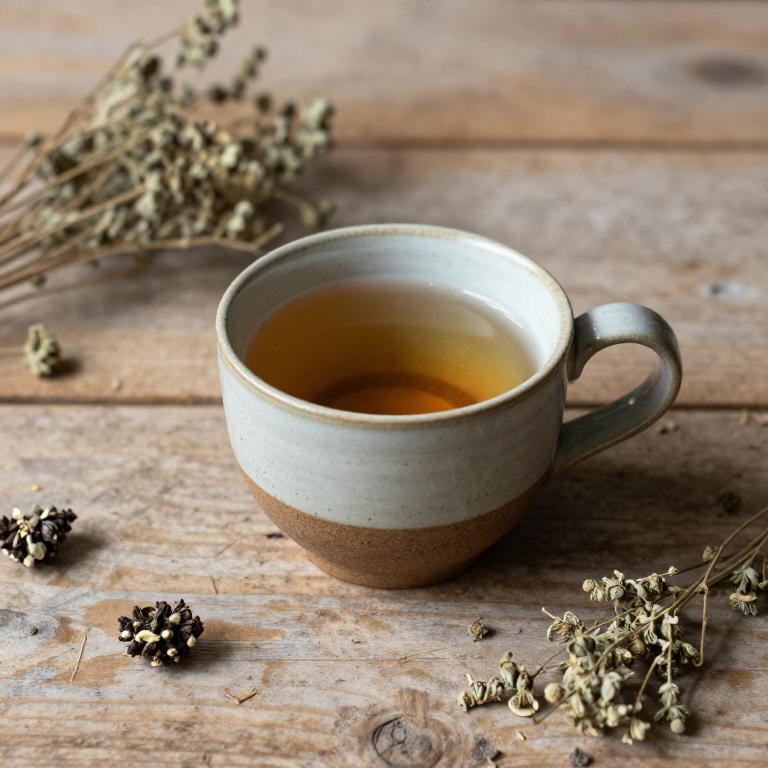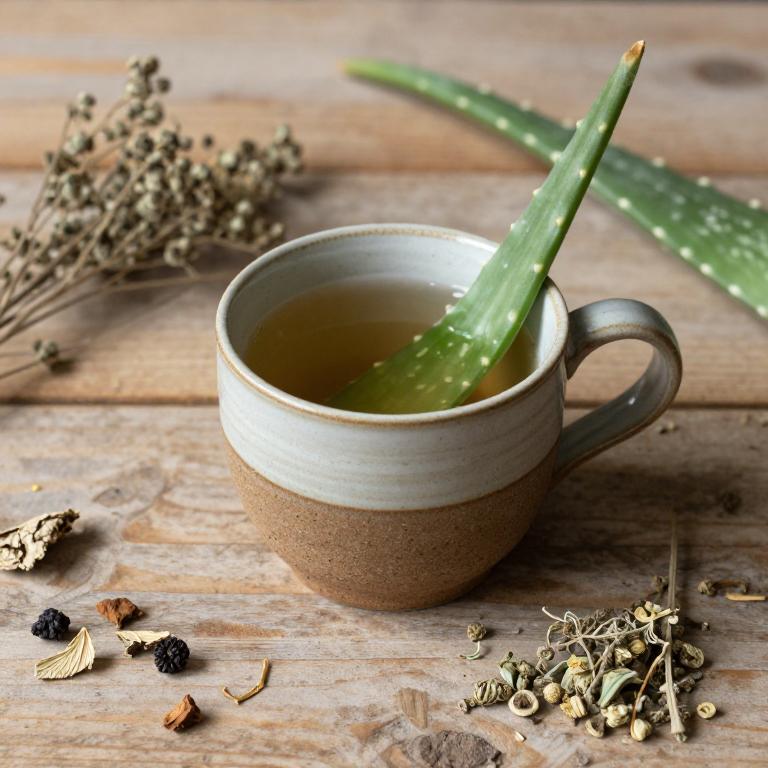10 Best Herbal Teas For Hyperpigmentation

Herbal teas can be a natural and effective remedy for hyperpigmentation due to their antioxidant and anti-inflammatory properties.
Ingredients like green tea, chamomile, and licorice root are commonly used because they help reduce melanin production and soothe the skin. These teas can be applied topically as a compress or consumed internally to support overall skin health. Regular use may help lighten dark spots and even out skin tone over time.
However, it is important to patch test and consult a dermatologist before incorporating herbal teas into a skincare routine.
Table of Contents
- 1. Turmeric (Curcuma longa)
- 2. Dog rose (Rosa canina)
- 3. Chaste tree (Vitex agnus-castus)
- 4. Centella (Centella asiatica)
- 5. Thistle (Silybum marianum)
- 6. Aloe vera (Aloe barbadensis)
- 7. St. john's wort (Hypericum perforatum)
- 8. Licorice (Glycyrrhiza glabra)
- 9. Camellia (Camellia sinensis)
- 10. Stinging nettle (Urtica dioica)
1. Turmeric (Curcuma longa)

Curcuma longa, commonly known as turmeric, is widely used in herbal teas for its potential benefits in addressing hyperpigmentation.
The active compound in turmeric, curcumin, possesses potent antioxidant and anti-inflammatory properties that may help reduce melanin production and even out skin tone. When consumed as a herbal tea, curcuma longa can support internal health, which in turn may improve skin conditions from within. However, it is important to note that topical application of turmeric is often more effective for hyperpigmentation than internal consumption alone.
As with any herbal remedy, it is advisable to consult a healthcare professional before incorporating curcuma longa into a skincare or wellness routine.
2. Dog rose (Rosa canina)

Rosa canina, also known as rose hip, is a herbal remedy that has been traditionally used for its skin-renewing properties.
Rosa canina herbal teas are rich in bioflavonoids, vitamin C, and essential oils, which help to brighten the skin and reduce the appearance of hyperpigmentation. These teas work by promoting collagen production and enhancing skin cell regeneration, leading to a more even skin tone. The anti-inflammatory and antioxidant properties of rose hips can also help to soothe irritated skin and prevent further pigmentation.
When consumed regularly or applied topically, rosa canina herbal teas may offer a natural and gentle approach to addressing hyperpigmentation concerns.
3. Chaste tree (Vitex agnus-castus)

Vitex agnus-castus, commonly known as chasteberry, has been traditionally used in herbal medicine for its potential benefits in hormonal balance, which may indirectly support skin health.
Herbal teas made from vitex agnus-castus are often recommended for women experiencing hormonal fluctuations that contribute to hyperpigmentation, such as melasma or post-inflammatory hyperpigmentation. The herb is believed to influence the pituitary gland and regulate estrogen levels, which can help reduce excessive melanin production. While scientific evidence supporting its direct effect on hyperpigmentation is limited, some studies suggest it may have antioxidant and anti-inflammatory properties that benefit the skin.
As with any herbal remedy, it is advisable to consult a healthcare provider before use, especially for those with existing medical conditions or on medications.
4. Centella (Centella asiatica)

Centella asiatica, also known as gotu kola, is a traditional herbal plant widely used in Ayurvedic and Chinese medicine for its skin-benefiting properties.
Centella asiatica herbal teas are particularly valued for their potential to reduce hyperpigmentation by promoting skin healing and enhancing collagen production. The active compounds in centella asiatica, such as asiatic acid and madecassol, help in reducing inflammation and stimulating cell regeneration, which can lighten dark spots and even out skin tone. Regular consumption of this tea may support overall skin health and contribute to a more radiant complexion.
However, it is advisable to consult a healthcare professional before incorporating it into a skincare routine, especially for those with sensitive skin or existing medical conditions.
5. Thistle (Silybum marianum)

Silybum marianum, also known as milk thistle, is a herbal remedy that has been traditionally used for its potential benefits in skin health.
Herbal teas made from silybum marianum are believed to support liver function, which can indirectly help with hyperpigmentation by improving detoxification and metabolic processes. The active compound silymarin in milk thistle may have antioxidant and anti-inflammatory properties that could reduce oxidative stress and inflammation, both of which are linked to skin discoloration. While some studies suggest it may aid in skin regeneration, more research is needed to confirm its effectiveness for hyperpigmentation specifically.
As with any herbal remedy, it is advisable to consult a healthcare professional before use, especially if you have existing health conditions or are taking other medications.
6. Aloe vera (Aloe barbadensis)

Aloe barbadensis, commonly known as aloe vera, is increasingly being used in herbal teas to address hyperpigmentation due to its potent anti-inflammatory and antioxidant properties.
The gel extracted from the aloe plant contains compounds like aloin and polysaccharides that help in reducing melanin production and promoting skin renewal. When consumed as a tea, aloe vera supports internal detoxification and may enhance the skin's natural ability to combat dark spots and uneven tone. Its mild, slightly bitter flavor makes it a versatile ingredient in herbal formulations designed for skin health.
While it is generally safe, individuals with sensitive stomachs should consult a healthcare provider before incorporating aloe tea into their routine.
7. St. john's wort (Hypericum perforatum)

Hypericum perforatum, commonly known as St. John's Wort, is a herbal plant that has been traditionally used for its potential skin benefits, including the treatment of hyperpigmentation.
The tea made from its dried flowers is believed to contain compounds such as hyperforin and flavonoids, which may help in reducing excess melanin production and promoting skin lightening. When applied topically or consumed as a tea, it may help to even out skin tone and reduce dark spots caused by sun exposure or hormonal changes. However, it is important to consult a healthcare professional before using St. John's Wort, as it can interact with certain medications and may have side effects.
While some studies suggest its efficacy for hyperpigmentation, more research is needed to fully understand its mechanisms and long-term safety.
8. Licorice (Glycyrrhiza glabra)

Glycyrrhiza glabra, commonly known as licorice root, has been traditionally used in herbal medicine for its potential benefits in treating hyperpigmentation.
The active compounds in licorice root, such as glabridin and liquiritin, are believed to inhibit the enzyme tyrosinase, which plays a key role in melanin production. This action may help reduce the appearance of dark spots and even out skin tone. When used in the form of herbal teas, licorice root can be applied topically or consumed internally to support skin health.
However, it is important to consult a healthcare professional before using licorice root, as it may interact with certain medications or have side effects in some individuals.
9. Camellia (Camellia sinensis)

Camellia sinensis, the plant from which green and black teas are derived, contains bioactive compounds such as polyphenols, catechins, and antioxidants that may help reduce hyperpigmentation by inhibiting melanin production.
These compounds work by suppressing the enzyme tyrosinase, which is essential for melanin synthesis, thereby lightening dark spots and promoting an even skin tone. Herbal teas made from Camellia sinensis, such as green tea infusions, are often used in skincare routines due to their anti-inflammatory and antioxidant properties. When applied topically or consumed internally, these teas may support skin health and reduce the appearance of age spots, sunspots, and acne scars.
However, individual results may vary, and it is advisable to consult a dermatologist before incorporating these teas into a skincare regimen for hyperpigmentation.
10. Stinging nettle (Urtica dioica)

Urtica dioica, commonly known as stinging nettle, has been traditionally used in herbal medicine for its potential skin benefits, including the treatment of hyperpigmentation.
This plant contains bioactive compounds such as vitamins, minerals, and antioxidants that may help in reducing melanin production and promoting skin clarity. When prepared as a herbal tea, stinging nettle can be consumed internally to support overall skin health from within. However, topical application of nettle extracts is also believed to aid in fading dark spots and even skin tone.
While some studies suggest its efficacy, more clinical research is needed to fully understand its role in treating hyperpigmentation.